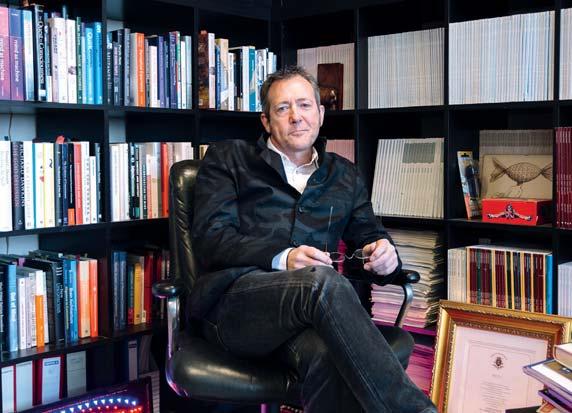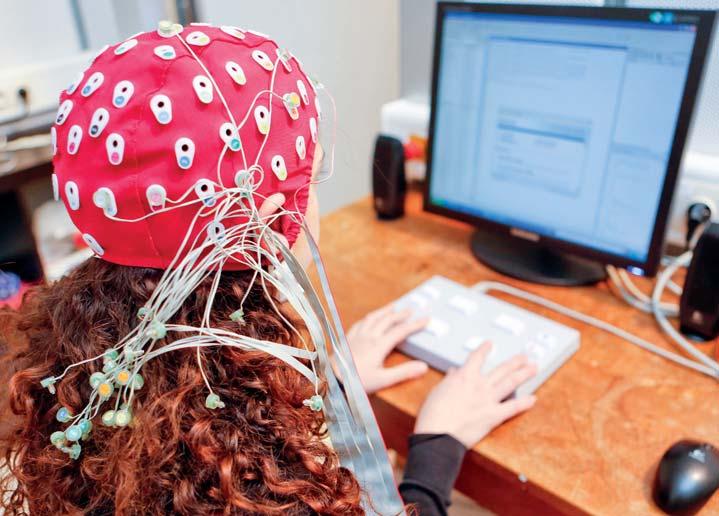
3 minute read
The Center for Research in Cognition & Neurosciences
by 5rXobdlLrFp
An interview with Prof. Axel CLEEREMANS, Director of the Cognition and Neuroscience Research Center of the Université Libre de Bruxelles
the other aiming to understand how collective decision-making processes can occur in groups of robots and, by extension, in groups of human beings (Prof. Axel Cleeremans and Marco Dorigo). It is about designing systems that can withstand the deactivation, at a given moment, of key elements of these systems.
Advertisement
© CRCN – ULB
What are the key figures for research at the Cognition & Neurosciences Research Center? Created in 2012 at the Faculty of Psychological Sciences and Education of the Université Libre de Bruxelles (ULB), the Cognition and Neurosciences Research Center (CRCN, crcn.ulb.ac.be) brings together a dozen professors, about ten postdoctoral researchers and about 35 doctoral students. It produces between 50 and 70 publications a year and currently benefits from ITN, EOS, ARC and Marie Skłodowska-Curie funding. Alongside the major research projects that mobilize it, various other projects (notably thanks to the F.R.S-FNRS) were able to see the light of day thanks to various mandates and individual grants.
What are the main lines of research at the Cognition & Neurosciences Research Center? The CRCN articulates its research work according to 4 main axes: learning and memory in a neuropsychological perspective (in particular the study of the role of sleep in the consolidation of learning and the typical and atypical cognitive development); the study of consciousness; the treatment of language, the consequences of deafness and digital cognition (number processing) with all that this implies for schooling and speech therapy, culture (literacy); executive control (ability to control behavior) and decision-making as well as its disorders. What do you think are the main challenges for neuroscience researchers in the years to come? I see two main challenges. The first is the application of basic research. Work on language, schooling, learning difficulties and pathologies of aging, whether in the diagnosis or rehabilitation of degenerative diseases, is still too often confined to laboratories. Today, it is a question of starting from these works and projecting them on situations of real life.
The second challenge relates to the integration of different approaches to the brain and its mental states: from the neuron to the brain as a whole, neurophysiologists, philosophers and neuropsychologists follow parallel paths and there is an urgent need for dialogue. This is the challenge of major projects such as Human Brain Project and Brain Initiative in the United States: they promote integration and renew reflection on the relationship between body and mind. The ULB Neuroscience (uni.ulb. ac.be), of which the CRCN is a part, also seeks to strengthen these interdisciplinary links. It remains to combine the objective scientific data, obtained by the MRI or the observation of the behaviors, and the subjective data of a subject living a given experiment...
Could you give us some examples of ongoing research projects? Two major projects are underway at the CRCN. Prof. Cécile Colin and Jacqueline Leybaert will soon be coordinating a European "Innovative Training Network" project dedicated to the study of hearing disorders during development - disorders with major but insufficiently studied consequences for schooling and socioemotional development. Fifteen PhD students in nine laboratories will be part of this coordinated network from ULB. As for Prof. Philippe Peigneux, he is also involved as coordinator in an EOS project (Excellence of Science, the successor to the Interuniversity Attraction Program at the federal level) devoted to the study of the mechanisms of memory, from the acquisition of a memory to its retention in the long-term memory. There are also two ARC Advanced projects, one dealing with the impact of culture on information processing (Prof. Olivier Klein and Régine Kolinsky),

© CRCN – ULB










